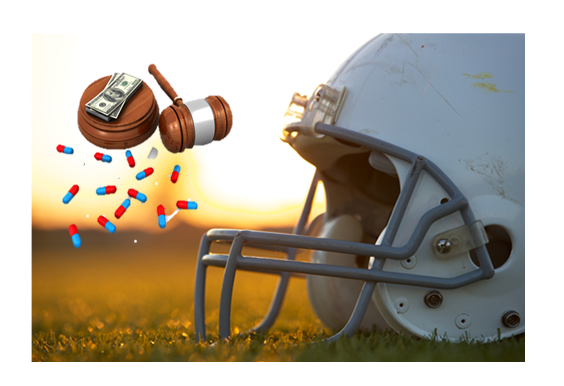Retired players including ex-Chicago Bears quarterback Jim McMahon accused the National Football League of using painkillers to mask injuries in a “culture of drug misuse,” expanding litigation over the damage former athletes suffered during their playing days.
While thousands of former NFL players have sued over concussions and other head injuries sustained on the field, the case filed Monday in federal court in San Francisco represents a new strategy to gain damages for old injuries, said Mark Conrad, director of the sports business program at Fordham University’s Gabelli School of Business.
 “It’s in one sense an injury-based lawsuit, but the theories behind it are quite different than the concussion lawsuits,” Conrad said in a phone interview. “Potentially you could have a lot of players in this case.”
“It’s in one sense an injury-based lawsuit, but the theories behind it are quite different than the concussion lawsuits,” Conrad said in a phone interview. “Potentially you could have a lot of players in this case.”
The eight former players who brought the suit claim the NFL administered cocktails of medications, including opioids, local anesthetics and anti-inflammatory drugs, with little regard for drug interactions or medical histories.
Ex-Chicago Bears defensive end Richard Dent, one of the named plaintiffs, received hundreds of injections and pills, including the painkiller Percodan and anti-inflammatories, according to the complaint. He was allegedly told by team doctors and trainers that by taking painkillers he could keep playing after breaking a bone in his foot. Today, he suffers permanent nerve damage in that foot, according to the complaint.
Painkiller Dependency
McMahon, who played quarterback for the Bears and the Philadelphia Eagles, says he became dependent on painkillers after 18 surgeries during his career. His multiple injuries were never allowed to heal properly and aggravated by continued play, according to the lawsuit.
“This is not about concussions,” Mel Owens, a California attorney for the players, said in an interview. “It’s not about head trauma. This is about the NFL culture of medication, numbing players in order to push profits.”
Doctors gave players medications without warning them of side effects or the dangers of mixing drugs, and unlicensed trainers also dispensed medicines, some of which were addictive, Owens said by phone. The practice violates U.S. drug laws, according to the complaint.
Brian McCarthy, an NFL spokesman, said in an e-mail that league attorneys haven’t yet reviewed the complaint.
Head Injuries
The NFL already faces accusations over head injuries. Claims by more than 5,000 ex-players that the league hid the link between traumatic head impacts and long-term brain injuries have been consolidated in federal court in Philadelphia. A judge in January refused to approve a $914 million settlement in those cases, saying not all players would be paid.
More than 500 players have signed on to the painkiller suit, including some who are also suing over concussions, said Owens of Namanny Byrne & Owens PC in Lake Forest, California.
The number of players covered by the complaint if it’s approved as a group lawsuit could be much more than 500 because the majority of NFL players are medicated while playing, said Owens, who played for the Los Angeles Rams.
“You cannot play this game without continuous medication,” he said.
The complaint seeks a court order blocking the NFL from medicating players so they can play with injuries, and requiring medical testing and monitoring of players with latent injuries and addictions, as well as unspecified compensatory and punitive damages.
The case is Dent v. NFL, 14-cv-02324, U.S. District Court Northern District of California (San Francisco).
Dent v. NFL Complaint:
http://www.scribd.com/doc/225478589/Players-Sue-NFL-Dent-v-NFL





















 Viewpoint: Runoff Specialists Have Evolved Into Key Strategic Partners for Insurers
Viewpoint: Runoff Specialists Have Evolved Into Key Strategic Partners for Insurers  10 Do’s and Don’ts of a Smart ORSA Report
10 Do’s and Don’ts of a Smart ORSA Report  Telematics and Trust: How Usage-Based Insurance Is Transforming Auto Coverage
Telematics and Trust: How Usage-Based Insurance Is Transforming Auto Coverage  High Court Ruling on Trump Tariffs to ‘Ease Uncertainty,’ Says AM Best
High Court Ruling on Trump Tariffs to ‘Ease Uncertainty,’ Says AM Best 





